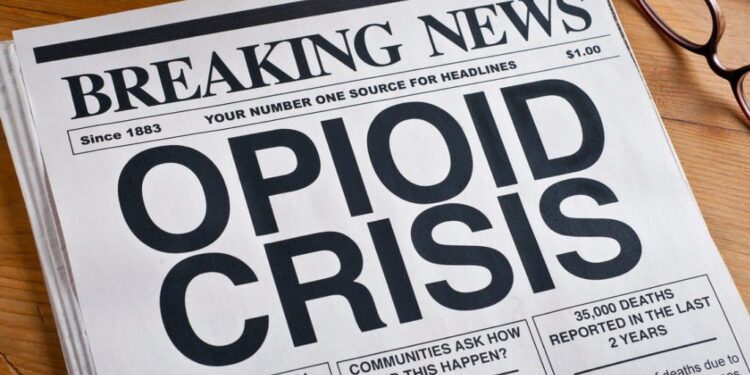There are many models that explain journalistic technique. Most of them begin with the refrain – the most important information comes first. Accordingly, I begin with a quotation by Friedrich Nietzsche: “All things are subject to interpretation. Whichever interpretation prevails at a given time is a function of power and not truth.”
This quotation alone summarizes many articles that cover the overdose crisis. Therefore, it’s the most important. It explains why we struggle to cover the opioid crisis. Journalism relies on facts. The foundation of the field is a balanced portrayal of facts. One story, two sides, two sets of facts, all explained as objectively as possible.
In the opioid crisis, however, there are no facts, no objectively definable truths. There are only perspectives. We can’t even agree on the data underlying core assumptions.
Take one of the more pervasive disagreements: addiction rates following the use of prescription opioids. Some have it at 20 percent, others at 3 percent. Those who believe the opioid crisis began with physicians overprescribing opioid support studies that tout the larger number. Those who believe the crisis began out of a confluence of trends – a growing number of pain patients and a trend toward heroin as the drug of choice for drug abusers – tout for the smaller number.
We fixate on such numbers. And we ceaselessly argue over which is right. But ultimately, they’re numbers devoid of context. Just ask any chronic pain patient, or a patient struggling with substance use dependency: those numbers mean nothing. They’re a thin veneer of data covering what is otherwise a fundamentally subjective experience.
Think of the pain scale. Remember being asked or overhearing someone being asked: what is your level of pain on a scale from one to ten? How is that anything but subjective? And in continuing that logic, let’s not forget how that number would be subsequently interpreted by a treating provider. In short order, we have two subjective points of assessment. On it goes – every interaction, a subjective assessment, to which we ascribe a proverbial data point, just to make it feel like we’re being objective.
We’re not – like we’re not applying a valid journalistic framework when we use specious data to craft a journalistic narrative. There are no sides to the opioid crisis. We are just beginning to understand addiction absent its moralistic façade, in solely medical terms.
So if we still lack a basic understanding of the opioid crisis, of what value is the journalistic framework in analyzing it? You can’t write about something you don’t understand. In this vein, I’ve constructed three back-of-the-envelope rules to help journalists make sense of the opioid crisis and frame the journalistic narrative around a complex, not yet defined concept.
- Chronic pain and addiction are uniquely experiential because they are subjective. Data is less reliable than in other medical disciplines.
- Most clinical studies in these two fields lack consistency in design or are biased in their methodologies. Avoid using multiple studies to derive one conclusion.
- Instead of identifying a single narrative, learn to think in a contrarian way when you piece together the elements of the story. The lack of a cohesive narrative is sometimes the most accurate story.
















Dr. Joshi,
I tried to send a message, via the contact us link, however, am experiencing errors. So I am hoping to at least get the message to you here. I wanted to say as someone who stumbled across your case a few months back that I absolutely, 100%, without a shadow of a doubt, believe your narrative. That aside, I also want to tell you THANK YOU! Thank you so very much for the work you are doing, it is so desperately needed and will help bring an end to this cruel era. You, sir, are an outstanding human being and an excellent doctor! I wish we had more of your caliber. Thank you!
This is really interesting, You’re a very skilled blogger. I’ve joined your feed and look forward to seeking more of your magnificent post. Also, I’ve shared your site in my social networks!
I agree. and in addition to the commentary above ” Opiate crisis” is misleading. Do we mean street drugs, or do we mean prescription drugs? What is the definition of overprescribing? Does this mean with intent? Does it mean the patient was diverting? Where did the data come from? The PMP – prescription database. is often a government source for “overprescribing”. The PMP uses a private algorithm formulated by third parties and contracted by the government. We don’t know what goes into the algorithm other than testimony from employees of these companies who have testified to criminal histories of patients, physician assets, distance traveled to pharmacies, the number of pharmacies utilized by patients, and the type of insurance. (Qlarent). That would not be a reasonable definition of overprescribing to a physician. In fact, these parameters create bias. (Jennifer Oliva 2022 Hasting Law Journal). Further how about privacy laws in gathering the data? The PMP violates many of them. ( too many to discuss here) Let’s use data that doesn’t violate individuals’ privacy and hide behind the word ” aggregate”. How about accuracy in the data entries? There is no transparency and no oversight. It’s time to move on from the catchphrase “opiate crisis” for journalists.
Well, there are kind of two sides.
.
It’s perhaps most important to realize that one side is carefully and maliciously crafting studies and data based on nothing but very clear, and obvious, cherry-picked falsehoods.
It’s most important to know that one side has actual science in their quiver, and the other has purposefully inflammatory and blatantly false claims in theirs. The entire anti-opioid community is willingly pushing very fragile patients to the edge, they are complicit in the wholesale torture of an entire population of patients.
AND NO ONE CARES.
No one is doing a damn thing to help us. I’m in this rapidly sinking boat, too. I’d wish very few ppl to be in my place (a certain Kolodny comes to mind).
Fact: the only opioid crisis is illicit fentanyl.
Fact: pain patients are dying and desperate for help.
Fact: no one is helping
Fact: the “other side” is a group of duplicitous liars that are destroying the field of medicine.
Help us.
Drs don’t treat pain out of fear some believe the false narrative. My meds have been cut by 80% now because of Work comp insurance and they require me to be at 0 by June. My PM Dr says it’s not her job to fight with them even after a judge declared my medication level is up to my Dr. I was told I’m just one patient & my Dr doesn’t have time to waste on me. Now I just sit in a chair all day.
JKJ: “We are just beginning to understand addiction absent its moralistic façade, in solely medical terms.”
Your consistently excellent and incisive thinking is a welcome breath of fresh air amidst the deepening throes of dark ages of pain management arising out of scientifically baseless moral crusades against people who use drugs, conducted under the deliberate subterfuge of a faux-medical junk-science mask, engendering and sustaining an entirely socially destructive crucible of abstrusely justified yet perniciously strategic subjective pseudo-psychiatric declarations endlessly waging war upon the human condition in a century-old morally and financially bankrupt inhumane barbaric endless war of intentionally crafted futility – designed to provide fame and monetary wealth for dubiously entitled privileged “moral entrepreneurs” at the expense and the literal demise of sacrificial “pharmakoi”.
“… the question of addiction … implicates more than simply a scientific theory which forms the basis of a discourse of addiction. At stake in a discourse on addiction is an economy of control (individual and collective) and its history of conquest. … So long as morality factors into the equation, addiction is not simply a scientific concept. … scientific theories of addiction are based on a concept whose religious, State, economic bases rationalize the marginalization of substances … The problem of a moral basis for a scientific concept of addiction is not only that it is a highly uncontrollable variable, … but the prescription of morals are also subject to forms of power that produce social distinctions in order to further colonize social spaces by marginalizing the ‘undesirable’ and promoting the ideal. … the classification of ‘addiction’ followed a desire to eradicate (colonize) a population of people or drugs. Therefore, while there continue to be ongoing clinical researches – in neuroscience, biology, psychology, chemistry, sociology – in search for the perfect theory of addiction, the concept of addiction invariably lies beyond the sciences. … Anyone can believe that there is a nature to such a thing as addiction, but a discourse’s relation to power confers legitimization and truth to the concept. … Whether something is legal or illegal, prohibited or promoted, does not reflect a natural (universal) essence, but rather a power over the body and the word. … social processes delineate the primary nature of drug/user relationship which characterizes addiction [as well as] how forces of colonization re-purpose rituals to serve colonial ideals. … the impositions of morality and higher social forces have made addiction a social tool and a concept irreconcilable with scientific theories.”
Source: “Addiction: the colonization of rituals”; Matthew Prokopiw, University of Western Ontario (2015):
https://ir.lib.uwo.ca/etd/3059
Thank you. I’m a retired nurse. I just wanted to speak out for the people who work in healthcare. Watching patients suffer is part of the reality of healthcare .We try to help people get better and make them feel better. Sometimes, when you have done all you can, you offer them something for pain. It’s hard to know that we can no longer give them a medication that once helped them. I hope we can do better.